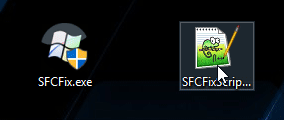Navigation
Install the app
How to install the app on iOS
Follow along with the video below to see how to install our site as a web app on your home screen.
Note: This feature may not be available in some browsers.
More options
You are using an out of date browser. It may not display this or other websites correctly.
You should upgrade or use an alternative browser.
You should upgrade or use an alternative browser.
[SOLVED] Updates failed since KB5036899 on windows server 2016.
- Thread starter Dr Phil
- Start date
Hello Peter,
I have an other server 2016 who had a similar problem [SOLVED] - Updates failed since KB5036899 on windows server 2016.
I can use it as source
Thanks
I have an other server 2016 who had a similar problem [SOLVED] - Updates failed since KB5036899 on windows server 2016.
I can use it as source
Thanks
Run the following script on the other server to collect the requested files.
Colllect Files
Colllect Files
- Download the attachment SFCFixScript.txt and save it on your desktop.
- Save any work you have open, and close all programs.
- Drag the SFCFixScript.txt file over the SFCFix.exe executable and release it.

- SFCFix will launch, let it complete.
- Once done, 2 files will appear on your desktop, called SFCFix.txt and Files.zip.
- Attach both files to your next reply.
Attachments
Maybe form an old ISO, not from one which is up-to-date ?
Edit:
I just noticed a small typo in the script in message #23.
Run the following script on the other server to collect the requested files.
Colllect Files
Edit:
I just noticed a small typo in the script in message #23.
Run the following script on the other server to collect the requested files.
Colllect Files
- Download the attachment SFCFixScript.txt and save it on your desktop.
- Save any work you have open, and close all programs.
- Drag the SFCFixScript.txt file over the SFCFix.exe executable and release it.

- SFCFix will launch, let it complete.
- Once done, 2 files will appear on your desktop, called SFCFix.txt and Files.zip.
- Attach both files to your next reply.
Attachments
Last edited:
Great. Where did you find them ?
Step 1:
WARNING! The following fix is specific to the user's system in this thread only. No one else should follow these instructions, as it could damage your system.
Step 2:
Restart the machine.
Run the command sfc /scannow in an elevated commandprompt and report the result.
If it fails, copy the file C:\Windows\Logs\CBS\cbs.log to your desktop.
Zip the copied file and attach the zipped cbs.log to your next reply.
Step 1:
WARNING! The following fix is specific to the user's system in this thread only. No one else should follow these instructions, as it could damage your system.
- Download the attachment SFCFix.zip and save it on your desktop.
- Save any work you have open, and close all programs.
- Drag the SFCFix.zip file over the SFCFix.exe executable and release it.

- SFCFix will launch, let it complete.
- Once done, a file will appear on your desktop, called SFCFix.txt.
- Attach that file to your next reply.
Step 2:
Restart the machine.
Run the command sfc /scannow in an elevated commandprompt and report the result.
If it fails, copy the file C:\Windows\Logs\CBS\cbs.log to your desktop.
Zip the copied file and attach the zipped cbs.log to your next reply.
Attachments
WARNING! The following fix is specific to the user's system in this thread only. No one else should follow these instructions, as it could damage your system.
- Download the attachment SFCFixScript.txt and save it on your desktop.
- Save any work you have open, and close all programs.
- Drag the SFCFixScript.txt file over the SFCFix.exe executable and release it.

- SFCFix will launch, let it complete.
- Once done, a file will appear on your desktop, called SFCFix.txt and Files2.zip.
- Attach both files to your next reply.
Attachments
Step 1:
WARNING! The following fix is specific to the user's system in this thread only. No one else should follow these instructions, as it could damage your system.
Step 2:
Restart the machine.
Run the command sfc /scannow in an elevated commandprompt and report the result.
If it fails, copy the file C:\Windows\Logs\CBS\cbs.log to your desktop.
Zip the copied file and attach the zipped cbs.log to your next reply.
WARNING! The following fix is specific to the user's system in this thread only. No one else should follow these instructions, as it could damage your system.
- Download the attachment SFCFixScript.txt and save it on your desktop.
- Save any work you have open, and close all programs.
- Drag the SFCFixScript.txt file over the SFCFix.exe executable and release it.

- SFCFix will launch, let it complete.
- Once done, a file will appear on your desktop, called SFCFix.txt and Files2.zip.
- Attach both files to your next reply.
Step 2:
Restart the machine.
Run the command sfc /scannow in an elevated commandprompt and report the result.
If it fails, copy the file C:\Windows\Logs\CBS\cbs.log to your desktop.
Zip the copied file and attach the zipped cbs.log to your next reply.
Attachments
Has Sysnative Forums helped you? Please consider donating to help us support the site!
